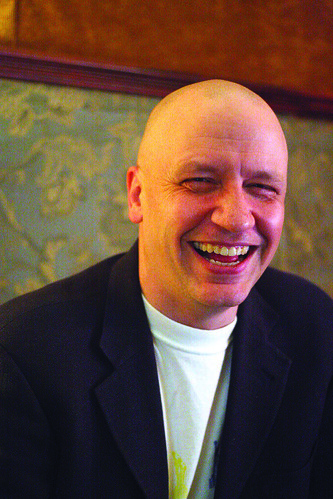
Communications Program Director Scott Gratson and senior film and media arts major Ryan Heller were star struck at the 2009 Emery Awards in New York City.
Honoring individuals dedicated to LGBTQ youth, the awards ceremony featured Heller’s Harvey Milk tribute video, introduced by Oscar-winning Milk screenwriter Dustin Lance Black. Gratson and Heller were fortunate to meet Black backstage.
“I said to him, ‘I really like your work. I wanted to tell you that,’ and then I told him that I did the [Harvey Milk legacy] archive, and he said, ‘Oh, I really liked it,’” Gratson said.
Gratson is more than a LGBTQ archivist and researcher. He is whole-heartedly committed to advocating and supporting the community, especially LGBTQ youth.
“Until every member of our community really believes that they’re not just tolerated, but empowered, we still have work to do,” Gratson said. “Everyone in [LGBTQ] activism says the same thing: ‘One day, I hope we don’t have to do this.’ It’s a given. I just know we’re not there yet.”
Gratson began teaching at Ball State University in Muncie, Ind., a place he described as “not exactly a thriving queer metropolis.”
While Gratson taught at Ball State, three gay students suffered attacks within a few months. One male student, who was attacked outside his dorm building, had “fag” carved into his chest with a coat hanger. A female student, wearing a T-shirt that read “big queer,” was almost raped by her assailant. And the third student, a male, was attacked outside his residence hall but defended himself using his black belt in martial arts.
After these events, Gratson helped establish a staff position dedicated to LGBTQ issues at Ball State.
Gratson eventually moved to the Metropolitan State College of Denver, where his work earned him the 2001 GLBT Ally of the Year Award.
He currently works as a mentor for the Point Foundation, a LGBTQ scholarship organization, and maintains a supportive presence for Main Campus LGBTQ students.
Gratson said the two biggest misconceptions about him are that, because he’s a challenging professor, he hates his students and that he’s gay.
“People are absolutely fascinated because they think that most people who work in the GLBTQ population must be gay, and then they find out that I’m happily married to a woman and have two children,” he said with a laugh.
For Gratson, nothing about being a part of a movement indicates you have to be a member of the population within that movement.
“There’s this other perception like, ‘Oh, you’re offended by [people thinking you’re gay],’” he added, “and I think, ‘Why would I be offended if someone thought I was gay?’ I would be more offended if someone thought I was a really scary bigot, or … harbored anger toward any group because of their identity.”
Josh Fernandez can be reached at josh@temple.edu.



Be the first to comment